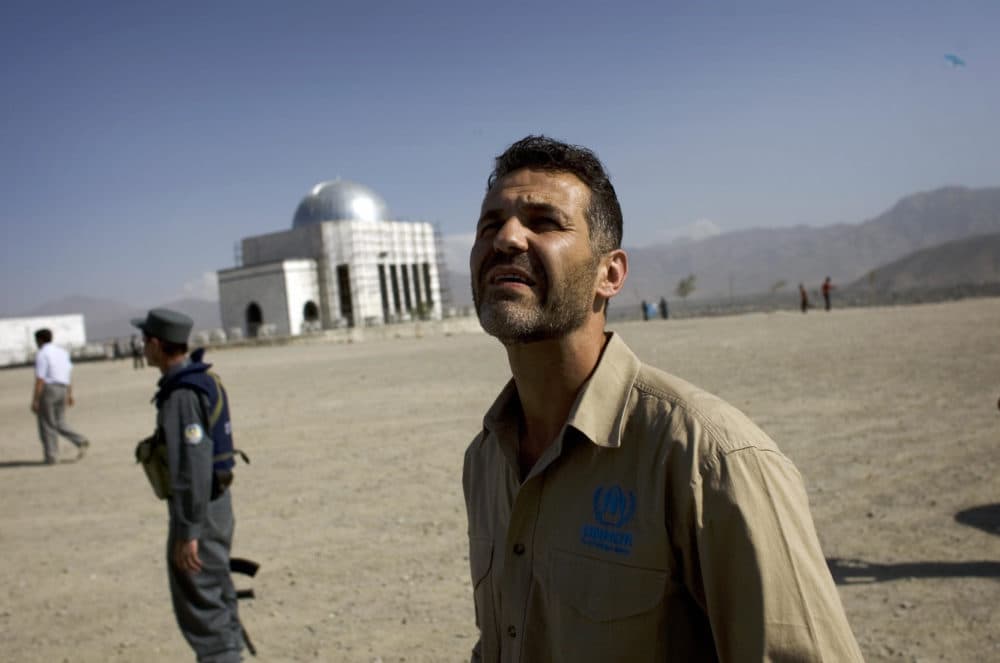Advertisement
First Person:
First Person: Novelist Khaled Hosseini Reflects On How Afghanistan Changed

Khaled Hosseini is a world-renowned novelist and author of bestsellers "The Kite Runner" and "A Thousand Splendid Suns." He was born in Afghanistan but left the country as a young man. His novels focus on the Afghanistan he knew growing up — before the warlords, before the Islamist militias, before the Russians and the Pakistanis and before the Americans made his country a forever battlefield. He now lives in California.
Hosseini told us that despite all the negatives that came with the American and allied occupation over the past 20 years, he saw his country healing. That ended this week. In the latest First Person diary, Hosseini remembers the Afghanistan of his childhood and calls on help for those left behind:
This week has been very painful for me.
I grew up in Afghanistan in an era that was — I think to most people's mind — is hard to believe: a peaceful Afghanistan where children could have a happy childhood. I certainly had one. It's a very, very different place, and to see the Taliban flag flying over my birthplace is very painful.
I've always had a deep, personal, emotional bond with the country every time I entered into Afghan airspace, and I look down and I see those beautiful mountains, those endless, endless mountain ranges down below, I feel a tug. I feel like I'm returning to a piece of myself I left behind decades before. And to see that beautiful land and those beautiful people and now the start of what appears to be another bleak era — it's a lot to take this very, very painful.
I'm worried for people who worked to preserve human rights in Afghanistan and the brave and the resilient and resourceful women who serve in the government, who became police chiefs, who became provincial governors, who became mayors, who advanced the cause for Afghan women. The brave girls who went to school despite the threats of the insurgents who attacked them in all sorts of abhorrent ways. I feel their pain. I feel their frustration. I feel their anxiety. And I feel their fear.
The country that the Taliban have conquered now is not the country that they left. And a lot has happened in Afghanistan the last 20 years. Millions of Afghans have gone to school and become educated and, you know, engaged, especially in the urban areas. The young, professional, educated Afghans have been engaging with the outside world through social media, discussing 21st century issues like human rights and gender equality and social injustice and the environment. [There are] millions and millions of cell phone users in Afghanistan. The country has really changed.
Advertisement
Right now, the entire world is watching the Taliban. every camera in the world is pointed at Afghanistan. But those cameras will be packed, and those journalists will leave. And the world will inevitably turn to some other corner, and some other crisis will come up. And Afghanistan will recede from the headlines. And the real question is: How will the Taliban behave then?
If I had a message for President Biden, I would say what is done is done. You can't go back into Afghanistan now, but you can do some things. I think it isn't too much to say that America owes Afghan refugees that much to take in Afghan refugees, the people that we left behind in Afghanistan in the middle of the night. I would also ask President Biden to use his influence on international committee to exert diplomatic pressure on the Taliban to respect the essential human rights of all Afghan citizens, particularly women and girls, and to not use intimidation and violence against its own citizens.
In this diary ... we hear from:
Khaled Hosseini, author of several books including "The Kite Runner" and "Sea Prayer." Founder of The Khaled Hosseini Foundation, a nonprofit that provides humanitarian assistance to the people of Afghanistan. (@khaledhosseini)
This segment aired on August 20, 2021.
